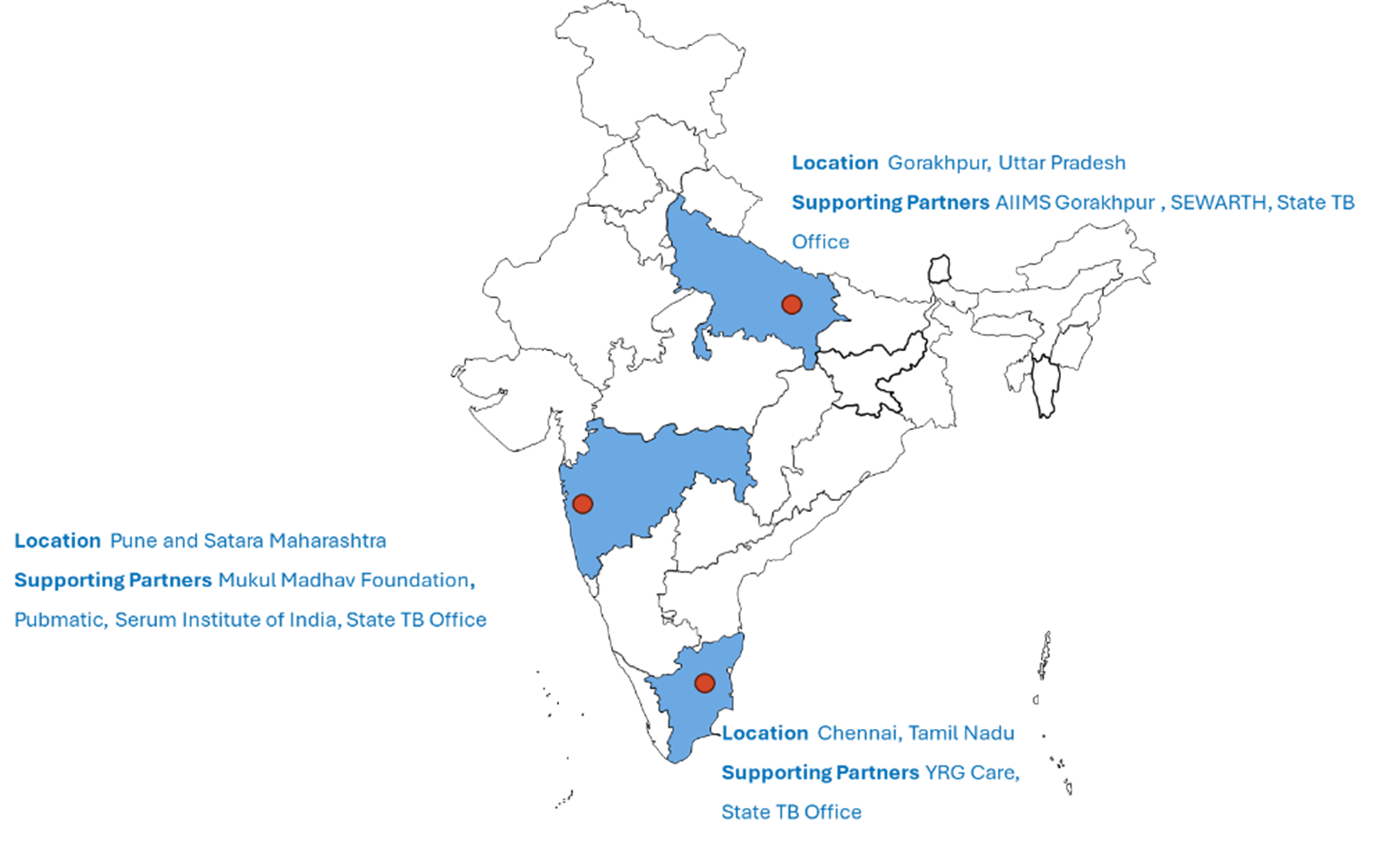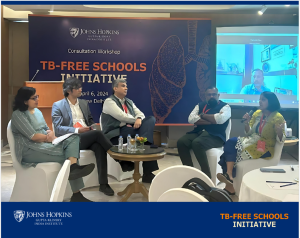TB Free Schools Initiative
In 2020, it was estimated that 56% adult males, 32% adult females and 12% children worldwide, have TB[1]. India has the highest TB burden in the world, with over 2 million cases and nearly half a million deaths (one-third of the global burden) each year[2]. Further it is estimated 3.33 lakh children in the 0–14 years’ age group become ill with TB each year (28% of global childhood TB burden), with a slightly higher burden among males. Pulmonary TB is the most common form in children, but extra-pulmonary TB forms a larger proportion of cases than in adults. It is also known that about 6% of the cases reported to National TB Elimination Programme (NTEP) are from children up to 14 years of age[3].
Our Expertise in Tuberculosis and Infectious diseases
Johns Hopkins University (JHU), renowned for its global health research and expertise, has been actively involved in addressing the tuberculosis (TB) epidemic in India. Johns Hopkins efforts in India have encompassed research, capacity building, and collaboration with local institutions and the government to advance TB control strategies in various geographies. JHU Clinical Trials have generated evidence that have changed the way tuberculosis is treated including shortening TB preventive treatment from nine months to one month[4],[5].Validated by the World Health Organization, the findings were incorporated into treatment guidelines[6].
TB Free Schools Initiative
 Our initiative builds on the success of India-JHU team led by Dr Kunchok Dorjee, who led an intervention project which included TB education, screening, treatment and preventive therapy in mobile service delivery models using cutting edge technology including artificial x-ray enabled image reading, molecular diagnostics and short course preventive treatment tools for the Tibetan population in Himachal Pradesh. This project demonstrated a reduction in TB cases in schools and monasteries in Dharamshala by 87% and showed it was cost effective.
Our initiative builds on the success of India-JHU team led by Dr Kunchok Dorjee, who led an intervention project which included TB education, screening, treatment and preventive therapy in mobile service delivery models using cutting edge technology including artificial x-ray enabled image reading, molecular diagnostics and short course preventive treatment tools for the Tibetan population in Himachal Pradesh. This project demonstrated a reduction in TB cases in schools and monasteries in Dharamshala by 87% and showed it was cost effective.
The TB Free Schools Initiative will undertake scaling up of this model across 4 sites in three states (Pune, Satara- Maharashtra, Gorakhpur- Uttar Pradesh, and Chennai-Tamil Nadu) in collaboration with the National TB Elimination Program as well as the Education Department. The initiative will also be supported by several non-profit organizations as well as CSR initiatives.
Rationale for our Project
Paediatric TB, which is defined as an infection in an individual younger than 15 years of age, is a public health problem of special significance. When children have TB disease, it often indicates recent transmission (because they are young and the amount of time, they could have been infected is limited) and usually primary disease from infection within the past 3–12 months.
The epidemiology of TB in pediatric population is not well understood in India as though studies have reported significant prevalence of Tuberculosis in children. The pediatric LTBI diagnosis is targeted towards children who have a history of contact with a patient suffering from active TB disease. On the contrary, infectious TB bacilli droplets are known to survive in the environment for more than six months7. There is evolving scientific understanding that most of the TB transmission occurs in the social and congregate settings such as in schools and community gatherings[7].
It is of essence to note that in the pediatric age group, addressing LTBI is more critical, as treating children with LTBI helps to prevent the development of active TB, which is not only more severe but also contagious.
Journey so far
The Gupta-Klinsky India Institute has initiated the preparatory activities towards the launch of the initiative in January 2025. The institute and our partners are committed to driving meaningful change and improving the health outcomes for children across the country. Our recent milestones are outlined subsequently.
 National Stakeholder Consultation: In April 2024, we kickstarted the conversation around TB-Free Schools Initiative with a national stakeholder consultation in New Delhi. This event brought together experts, policymakers, and educators to discuss and shape the future direction of our efforts in creating TB-free school environments.
National Stakeholder Consultation: In April 2024, we kickstarted the conversation around TB-Free Schools Initiative with a national stakeholder consultation in New Delhi. This event brought together experts, policymakers, and educators to discuss and shape the future direction of our efforts in creating TB-free school environments.

Community Sensitization Efforts in Satara Maharashtra: In July 2024, we initiated community sensitization programs at our project site in Maharashtra to raise awareness about TB prevention and treatment. These efforts are critical in educating communities, reducing stigma, and encouraging early detection and treatment of TB among children. Team of clinician and social workers visited school in Yervada and conducted TB awareness session for children studying in 7th and 8th std. Response from the students and teachers was overwhelming
 TB Free Schools Initiative Pre-Launch Workshop Held in Chennai: On July 3–4, 2025, project teams came together in Chennai for a two-day preparatory workshop to align efforts and finalize operational plans for the upcoming TB Free Schools Initiative (TFSI). Led by the Gupta-Klinsky India Institute (GKII) at Johns Hopkins University in collaboration with implementing partner YRGCARE, the initiative focuses on identifying, treating, and preventing tuberculosis among school-going children.
TB Free Schools Initiative Pre-Launch Workshop Held in Chennai: On July 3–4, 2025, project teams came together in Chennai for a two-day preparatory workshop to align efforts and finalize operational plans for the upcoming TB Free Schools Initiative (TFSI). Led by the Gupta-Klinsky India Institute (GKII) at Johns Hopkins University in collaboration with implementing partner YRGCARE, the initiative focuses on identifying, treating, and preventing tuberculosis among school-going children.
Our Recent Media Coverage
- Johns Hopkins University and Indian partners launch ‘TB-Free Schools’ initiative in India by Pune Mirror
- How an Indian-American at Johns Hopkins University is planning to fight against TB in India by Forbes India
- Johns Hopkins University launches programs in India for paediatric TB elimination and promote women leadership in R&D by Mint
- Johns Hopkins University launches 2 programmes in India to address paediatric TB, promote women in STEMM by Indian Express
Our Supporting Partners
- Center for Infectious Diseases in India at Johns Hopkins University
- Makhija Foundation
- Mukul Madhav Foundation
- Pubmatic
- Serum Institute of India
- Ujala Foundation
- Wyncote Foundation
- YRG Care
References
|
[1] Global tuberculosis report (2020) Geneva: World Health Organization; Available at: https://www.who.int/publications/i/item/9789240013131 |